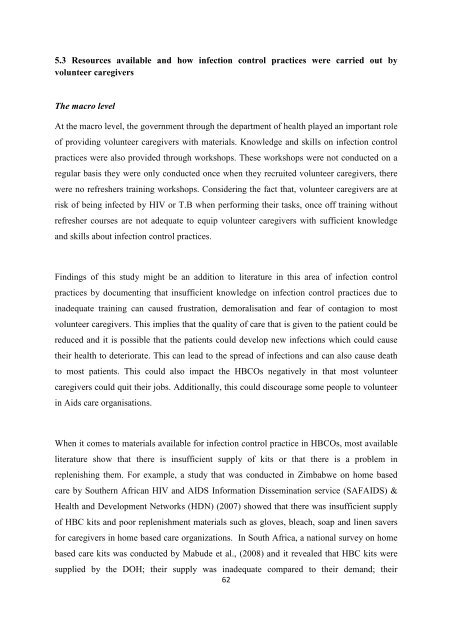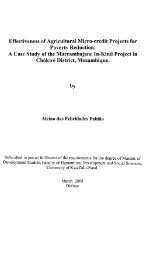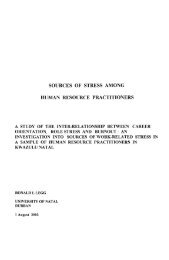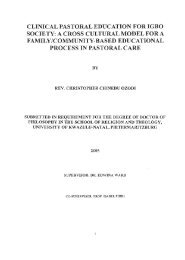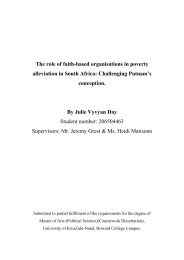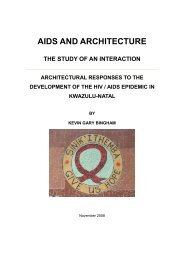View/Open - ResearchSpace - University of KwaZulu-Natal
View/Open - ResearchSpace - University of KwaZulu-Natal
View/Open - ResearchSpace - University of KwaZulu-Natal
Create successful ePaper yourself
Turn your PDF publications into a flip-book with our unique Google optimized e-Paper software.
5.3 Resources available and how infection control practices were carried out by<br />
volunteer caregivers<br />
The macro level<br />
At the macro level, the government through the department <strong>of</strong> health played an important role<br />
<strong>of</strong> providing volunteer caregivers with materials. Knowledge and skills on infection control<br />
practices were also provided through workshops. These workshops were not conducted on a<br />
regular basis they were only conducted once when they recruited volunteer caregivers, there<br />
were no refreshers training workshops. Considering the fact that, volunteer caregivers are at<br />
risk <strong>of</strong> being infected by HIV or T.B when performing their tasks, once <strong>of</strong>f training without<br />
refresher courses are not adequate to equip volunteer caregivers with sufficient knowledge<br />
and skills about infection control practices.<br />
Findings <strong>of</strong> this study might be an addition to literature in this area <strong>of</strong> infection control<br />
practices by documenting that insufficient knowledge on infection control practices due to<br />
inadequate training can caused frustration, demoralisation and fear <strong>of</strong> contagion to most<br />
volunteer caregivers. This implies that the quality <strong>of</strong> care that is given to the patient could be<br />
reduced and it is possible that the patients could develop new infections which could cause<br />
their health to deteriorate. This can lead to the spread <strong>of</strong> infections and can also cause death<br />
to most patients. This could also impact the HBCOs negatively in that most volunteer<br />
caregivers could quit their jobs. Additionally, this could discourage some people to volunteer<br />
in Aids care organisations.<br />
When it comes to materials available for infection control practice in HBCOs, most available<br />
literature show that there is insufficient supply <strong>of</strong> kits or that there is a problem in<br />
replenishing them. For example, a study that was conducted in Zimbabwe on home based<br />
care by Southern African HIV and AIDS Information Dissemination service (SAFAIDS) &<br />
Health and Development Networks (HDN) (2007) showed that there was insufficient supply<br />
<strong>of</strong> HBC kits and poor replenishment materials such as gloves, bleach, soap and linen savers<br />
for caregivers in home based care organizations. In South Africa, a national survey on home<br />
based care kits was conducted by Mabude et al., (2008) and it revealed that HBC kits were<br />
supplied by the DOH; their supply was inadequate compared to their demand; their<br />
62


